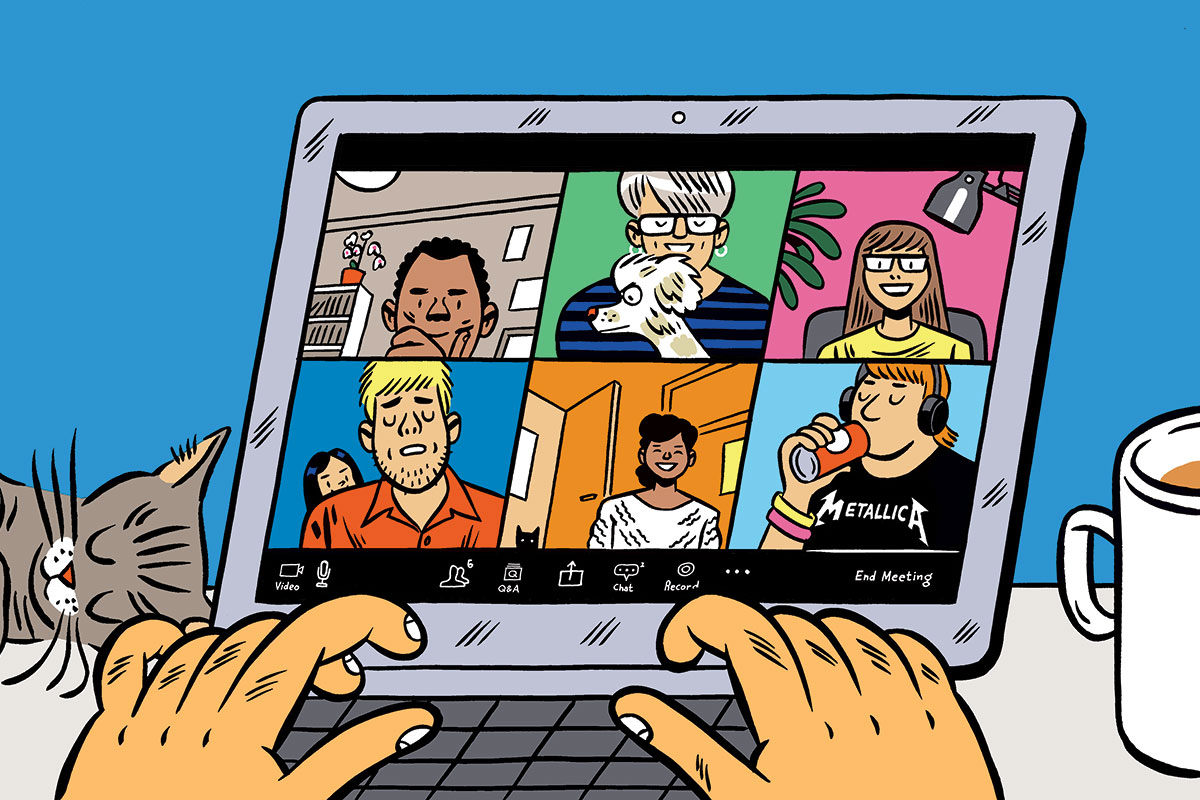How social landlords are shifting to remote working
With many more housing professionals now working from home, Kate Youde finds out how associations are adjusting to this ‘new normal’. Illustration by Jason Ford
Garden treasure hunts, robot battles and maths with bugs are not usually part of the job description for Orbit’s training team.
But, unable to do their usual face-to-face work because of the coronavirus lockdown, they have turned their attention to helping the association’s employees with their new home schooling responsibilities.
The team has produced activity packs targeted at different age groups of children, featuring everything from maths and English to recipes and craft projects.
The packs will be refreshed every few weeks while the restrictions continue. “They have landed really well [with staff],” says Craig Wilcockson, group people director at the 44,000-home association.
This is one small example of the seismic changes to working being felt throughout the sector as a result of the coronavirus crisis. All social landlords are having to find different ways to adapt to home working, so how are they coping?
“Closing our building wasn’t as big a problem as it might have been for others - we were able to pretty much close it overnight because people had their kit at home”
The transition has been easier for some than others, says Sarah Finnegan, head of member relations at the National Housing Federation (NHF). “Over the past few years lots of housing associations have been moving towards more flexible working, enabling teams to work remotely and from home, and a lot of those had a lot of these practices and technologies in place,” she says.
This is true for Halton Housing, where “agile is the norm”, according to Debbie Trust-Dickinson, the 7,000-home association’s interim chief operating officer. Employees already had laptops, iPads and mobiles rather than dedicated desks with desktop computers. They use Microsoft SharePoint for document management and collaboration, and social network Yammer for internal communications.
“Closing our building, which is what we did, wasn’t as big a problem as it might have been for others because we were able to pretty much close it overnight because people had their kit at home,” says Ms Trust-Dickinson. “Even call centre people are able to take and make calls from anywhere so they could go home and continue to carry on as usual.”
For others, the lockdown has accelerated the roll-out of agile working and the technology that supports that. “The typical comment is, ‘We were working towards this and now we have had to do this in a hurry and we are surprised about how well it’s working,’” says James Tickell, partner at consultancy Campbell Tickell, which hosts a WhatsApp group for 200 sector chief executives.
“We found out there’s people who live on their own and coming to work is their social life. The challenge has been to keep people connected and doing something social as well as work”
Orbit was “already on the spectrum”, with many staff having the necessary kit, but was not as agile as it wanted, says Mr Wilcockson.
Now, 87% of its 1,200 employees are working remotely. The association has closed 16 of its 18 offices. It is rotating employees at its contact centre – where capacity has been reduced by 65% to about 50 workers and there is a cleaner on site permanently – and it has a handful of people working at its head office to deal with legal documentation. The “biggest fear” was operating payroll and finance remotely, but Mr Wilcockson says this has worked well.
The IT department at Your Housing set up 894 of the association’s 1,100 staff on Microsoft Teams – which allows people to work together remotely – in the space of nine days, rather than the planned six-month roll-out. It also worked with 100 people to make sure they could access the landlord’s network through personal rather than work-issued devices.
The 28,000-home association’s head office in Warrington remains open between 10am and 12pm so repairs and maintenance operatives can pick up personal protective equipment (PPE). A couple of members of the IT department are also on hand to replace equipment and carry out repairs: staff can drop off their machines on the front desk and wait in their cars while they are fixed.
“The new normal will involve more remote working”
The biggest challenge has been that “some people don’t want to work from home”, says Stephen Joyce, director of HR at Your Housing. “We found out there’s people who live on their own and coming to work is their social life. The challenge has been to keep people connected and doing something social as well as work.”
Employees have taken part in lunchtime quizzes on Microsoft Teams and gathered around their screens for a chat and a drink after work on Fridays. “That’s the kind of thing people have done themselves and we didn’t plan for but I think that’s keeping up spirits a little bit,” Mr Joyce says.
Mr Tickell says home working in the sector is “a very mixed picture”.
“What everybody is saying is that for some of their colleagues working at home works perfectly well and for others it is an absolute nightmare,” he says. “It depends on the job they do and their personal circumstances.”
He says it is particularly problematic for people living in cramped accommodation with children and no garden. Unreliable broadband is another headache.
Employee mental health is a key consideration. Halton has issued guidance to managers on keeping in touch with their teams via Microsoft Teams and put motivational tips on working from home, health and mental well-being on Yammer, while Your Housing has a COVID-19 section on its ‘Youggle’ intranet with advice on everything from exercise to Netflix recommendations, and home schooling to accessing telephone counselling.
Orbit’s dedicated coronavirus app for employees includes practical tips on working from home and information on getting support from outlets including the association’s 30 mental health champions and the free, confidential external employee assistance programme.
Of course, not all staff can work from home. “Landlords at the moment are really focused on keeping those essential services going, to make sure their residents are safe and well, and ensuring their staff can work safely,” says the NHF’s Ms Finnegan.
In numbers
87%
Proportion of Orbit’s 1,200 employees who are working remotely
894
Number of Your Housing staff set up on Microsoft Teams in the space of nine days
30
Number of Orbit’s mental health champions
For Orbit, this means doing only emergency work such as gas repairs and some estate work to deter anti-social behaviour and people congregating.
Andrew Dobbie, national officer for community at trade union Unison, says that in cases where people are continuing to work on the frontline, such as in hostels, housing associations are responding “quite well to make sure they can do that in a safe way both for the residents and those supporting the residents”.
Your Housing’s Mr Joyce says “trying to balance the service to tenants and staff welfare… is one of the most difficult things”.
The association has tried “to be one step ahead of the government”. Britons evacuated from China in January were held in quarantine in key worker accommodation owned by Your Housing at Arrowe Park Hospital in Wirral. Public Health England took over the facility, but the landlord made sure to get hold of risk assessments from the NHS so it would know the best practice for making an essential repair in the home of someone with coronavirus – and ordered the PPE being used.
Rather than furloughing staff, the association is asking some home-working employees with reduced workloads, including Mr Joyce’s own HR team, to take on tasks outside their core roles. Similarly, Orbit and Halton are redeploying staff to help make phone calls to vulnerable tenants to check on their welfare.
It remains to be seen whether the lockdown will have long-term implications for how associations operate. However, Mr Tickell believes that, in light of the relative success of home working to date, organisations will look at how many offices they really need and who could work from home a few days a week. “The new normal will involve more remote working,” he says.
He says organisations can take the opportunity to look at what investment they would need to make – in broadband, security features to comply with data protection legislation and better home office equipment – to facilitate this.
When people do return to the office, the bonds between colleagues may actually be stronger because remote working could be aiding team building. Mr Joyce has seen colleagues’ partners and pets for the first time. “Everyone has seen everyone’s wallpaper and bedstead over the course of the past few weeks, so it’s got to help.”
More on coronavirus
To see all our coronavirus coverage to date – including the latest news, advice to providers, comment and analysis – use the link below.
















